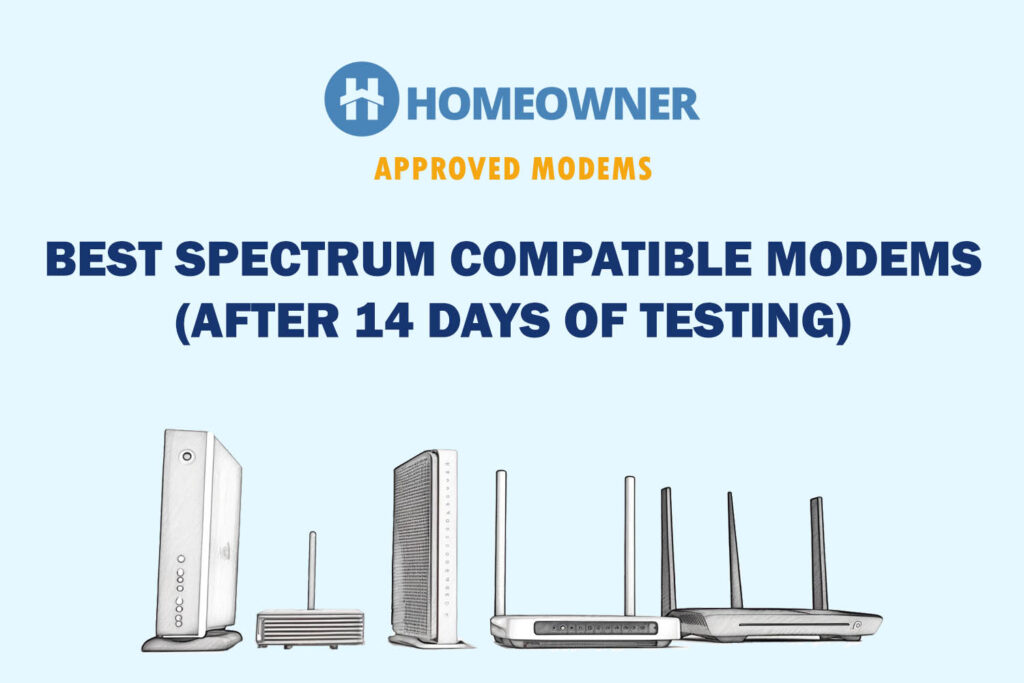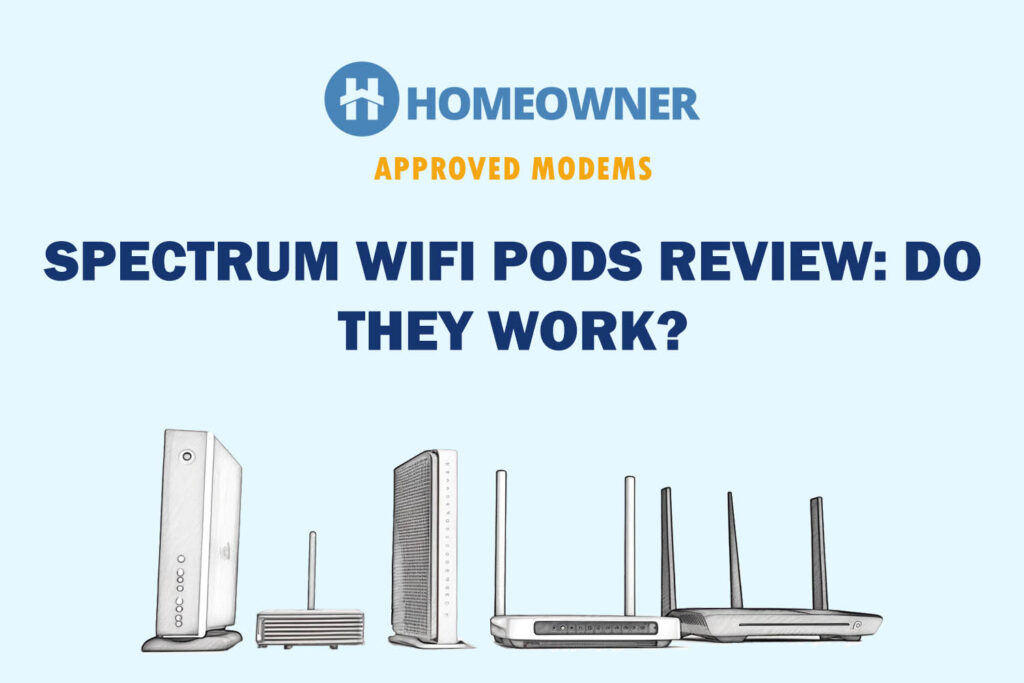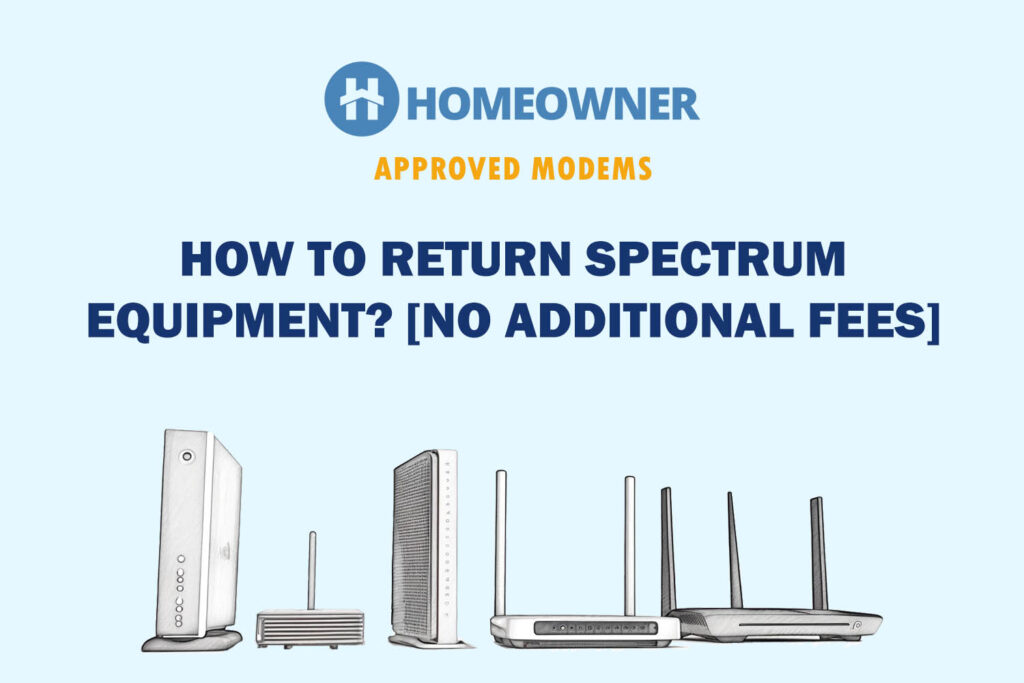Thinking of getting a new internet connection at your place? Confused about choosing between Google Fiber and Spectrum? Let me help you ease your decision-making.
Google Fiber started decade a ago and offers ultra-fast internet through fiber optic cables. In contrast, Spectrum is a well-established provider that offers cable internet.
Both the service types, i.e., Fiber and Cable internet differ in several aspects, including tech infrastructure, speeds, availability, additional services, and costs. Both have their own Pros and Cons, and picking one depends on your region, needs, and budget.
Key Differences Between Google Fiber and Spectrum
Choice of Plans: Google Fiber has 4 plans — 1 Gbps, 2 Gbps, 5 Gbps, and 8 Gbps. Spectrum has various plans, starting from 300 Mbps to 1000 Mbps. Additionally, Spectrum also offers bundle plans that combine internet, TV, and phone services.
Downloads & Uploads: While the download speeds would be almost identical, it’s the upload speed that has a major difference. Google Fiber offers double the upload speed of Spectrum.
Data Cap: There is no sort of data cap on either of the ISPs.
Availability: Google Fiber is only available in select cities across the United States, primarily in larger metropolitan areas. Spectrum, on the other hand, is available in many areas (40+ states), making it more accessible.
Contract Length: Both Google Fiber and Spectrum offer contract-free internet plans, meaning that you can pay on a monthly basis and are not required to pay an early termination fee if you decide to cancel Google Fiber or Spectrum.
Cost: Fiber plans are generally more expensive than cable, primarily because fiber optic internet offers faster speeds and better technology. However, pricing can vary depending on location and plan.
Installation: Google Fiber requires professional installation, and the company typically sends a technician to set up the service at no extra cost. On the contrary, you can either self-install Spectrum or opt for pro-installation costing $60.
Customer Service: Both internet service providers offer customer support through various channels. However, Google is known for providing better customer service, with shorter wait times and more knowledgeable support staff.
Internet Plans Comparison
Below I have listed all the plans offered by both service providers to give you an idea about their pricing. Other than that, I have compared them on the basis of internet speed, reliability, availability, pricing, hidden costs, and installation options.
Google Fiber Plans
| Speed Tier | Price | Equipment Included |
|---|---|---|
| 1 Gig | $70/mo | Nest Wifi Pro with Wi-Fi 6E |
| 2 Gig | $100/mo | Multi-gig Wi-Fi 6E router, up to 2 Mesh Extenders |
| 5 Gig | $125/mo | Multi-gig Wi-Fi 6E router, up to 2 Mesh Extenders |
| 8 Gig | $150/mo | Multi-gig Wi-Fi 6E router with 4 ports, 2 Mesh Extenders |
Google Fiber offers symmetrical download and upload speeds. It does not have data caps or contracts and provides customers with a free router.
However, it is only available in select cities (more on it in the dedicated availability section), and the service can be more expensive than other providers in some areas.
Google Fiber may be the better choice for those in select cities who prioritize faster internet speeds and top-notch customer service.
Spectrum Internet Plans
| Plan | Download | Upload | Price | Data Cap |
|---|---|---|---|---|
| Spectrum Internet | 300 Mbps | 10 Mbps | $49.99 | No |
| Spectrum Internet Ultra | 500 Mbps | 20 Mbps | $69.99 | No |
| Spectrum Internet Gig | 1000 Mbps | 35 Mbps | $89.99 | No |
Spectrum offers internet plans with speeds ranging from 300 Mbps up to 1 Gbps, with prices starting at $49.99 per month, which makes it more affordable.
Spectrum's plans also come with unlimited data and no contracts. However, its prices can increase after the initial promotional period.
Google Fiber vs Spectrum: Detailed Comparison
I have used both Google Fiber and Spectrum, individually, for more than 6 months. Having used both services in different scenarios, be it standard home use, office use, gaming, and more, allowed me to observe their performance across varying parameters.
Below, I have compared Google Fiber with Spectrum across diverse parameters, so that you can know which one shines where and decide accordingly.
Speeds and Latency
Google Fiber and Spectrum both offer high-speed internet, but there are some differences to consider. Google Fiber offers internet speeds of up to 2 Gbps, depending on the location, which is insanely fast for an average user.
Google does not have data caps which means that customers can use the internet as much as they want.

I did the speed test of the 2 Gig plan and got 1950+ Mbps of download and 1830+ Mbps of upload speed which is very close to what they claim. Additionally, Google Fiber boasts low latency of just 2 ms which is the lowest I have experienced.
Spectrum, on the other hand, offers internet speeds of up to only 1 Gbps, which is fast but half the top speed of what Google Fiber offers.
Similar to Google Fiber, Spectrum plans also comes with no data caps and you can use as much data as you want.
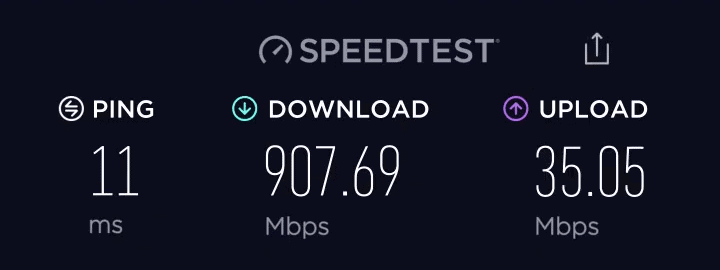
Spectrum's Internet Gig plan and got around 905 Mbps of download speed and over 35 Mbps of upload speed which is fine. However, the latency is a bit higher compared to Google Fiber, which may be a concern for professional gamers.
In the end, you need to decide which type of internet meets your needs best. Casual users will find that Spectrum more than meets theirs needs, but power users may need fiber internet to take full advantage of their service.
Winner: Google Fiber readily beats Spectrum in this department. Also, Spectrum's latency is slightly higher than Google Fiber's.
Performance & Reliability
Google Fiber consistently delivered the speeds promised, and there were no issues with buffering or slowdowns. At the same time, Spectrum also delivered good enough download and upload speeds.
I also tested gaming on Google Fiber and found that it provided a smooth and responsive experience with minimal lag. Gaming on Spectrum was generally a good experience too, but still, Google Fiber is a bit ahead in gaming.
I also tested other activities, such as streaming 4K videos and browsing the web, and found that both Google Fiber and Spectrum provided a reliable and consistent experience.
When it comes to uptime and reliability, both service providers performed well. I experienced very little downtime during our testing period with both providers, and any issues that did arise were quickly resolved.
Winner: Google Fiber may offer slightly better performance and reliability for gaming and other bandwidth-intensive activities, both providers are reliable and provide consistent internet speeds for general use.
Availability / Coverage
Google Fiber, although a decade old, is still not widely spread over the country. Its availability is limited to 18 states in the US. While it has plans to expand to more cities in the future, its rollout has been slow and limited compared to other providers.
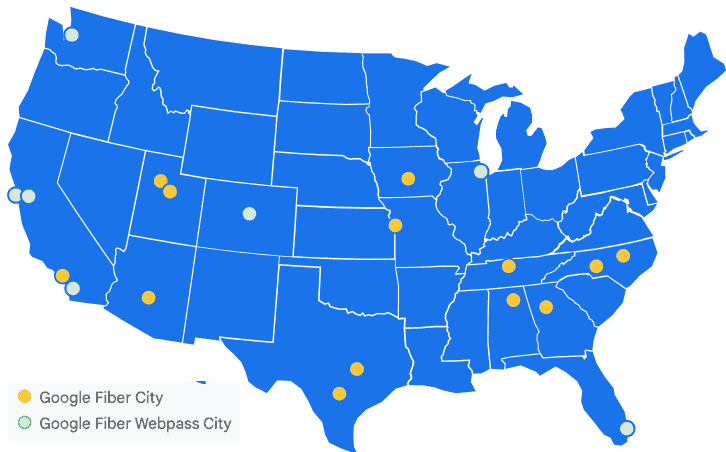
Below is a list of states & cities where Google Fiber is available:
States:
| Arizona | Idaho | Missouri | South Carolina |
| California | Illinois | North Carolina | Texas |
| Colorado | Iowa | Ohio | Utah |
| Florida | Kansas | Oklahoma | |
| Georgia | Kentucky | Oregon |
Cities:
| Atlanta | Irvine | Orange County | San Francisco |
| Austin | Kansas City | Portland | Seattle |
| Charlotte | Louisville | Provo | The Triangle |
| Denver | Miami | Salt Lake City | |
| Huntsville | Nashville | San Antonio |
Spectrum
Spectrum has a wider coverage area and is available in most cities and towns across the United States. It operates in more than 40 states and covers over 100 million people. This makes it better than Google Fiber in this regard.
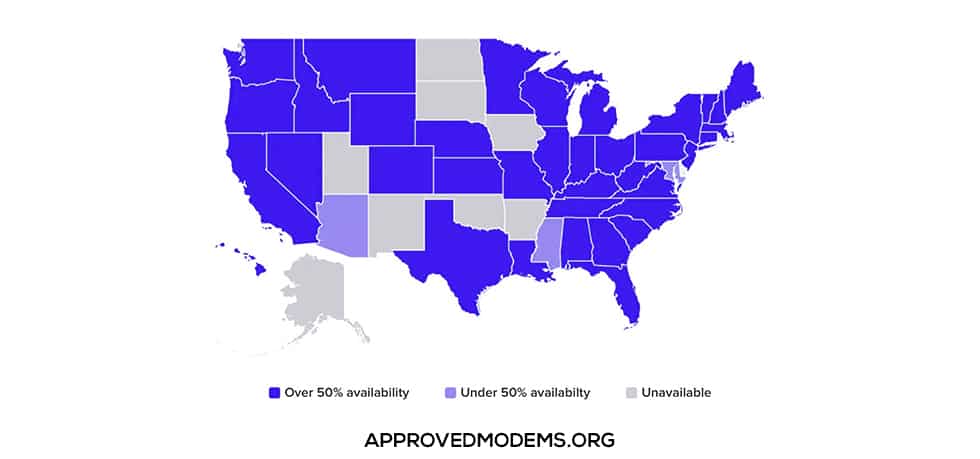
States:
| Alabama | Iowa | Nebraska | Tennessee |
| Arizona | Kansas | Nevada | Texas |
| Arkansas | Kentucky | New Hampshire | Utah |
| California | Louisiana | New Jersey | Vermont |
| Colorado | Maine | New Mexico | Virginia |
| Connecticut | Maryland | New York | Washington |
| Florida | Massachusetts | North Carolina | West Virginia |
| Georgia | Michigan | Ohio | Wisconsin |
| Hawaii | Minnesota | Oregon | Wyoming |
| Idaho | Mississippi | Pennsylvania | |
| Illinois | Missouri | Rhode Island | |
| Indiana | Montana | South Carolina |
Winner: In terms of availability and coverage, Spectrum has a clear advantage over Google Fiber.
Pricing & Other Costs
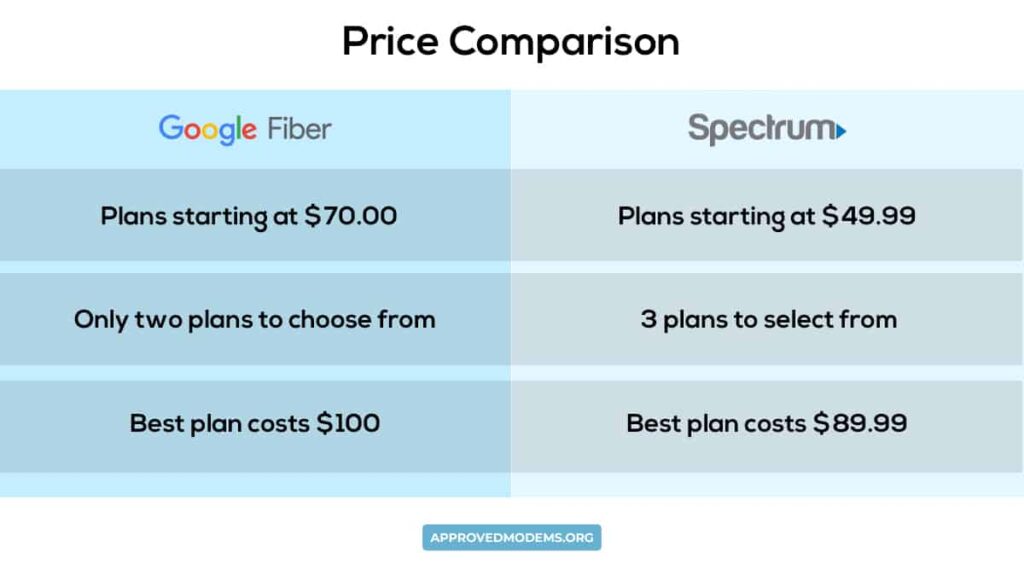
Google Fiber offers a basic internet plan for $70 per month with speeds up to 1 Gbps and a premium plan for $100 per month with speeds up to 2 Gbps. There are no equipment rental fees, installation fees, or contracts required.
On the other hand, Spectrum offers one more plan of 300 Mbps at $49.99 per month, and there's no multi-gig plan available.
Spectrum also offers promotional pricing for the first 12 months of service. They charge a one-time installation fee of $50 and equipment rental fees per month, depending on the type of equipment required.
However, Spectrum does not require a contract and offers a 30-day money-back guarantee. Plus, you can use your own equipment to save on rental leases. IMO, buying own equipment gives better returns and performance over ISP-rented equipment.
Here are my recommendations:
Winner: Spectrum provides a more affordable option for those looking for high-speed internet, but the additional fees may add up over time.
Installation Options & Fees
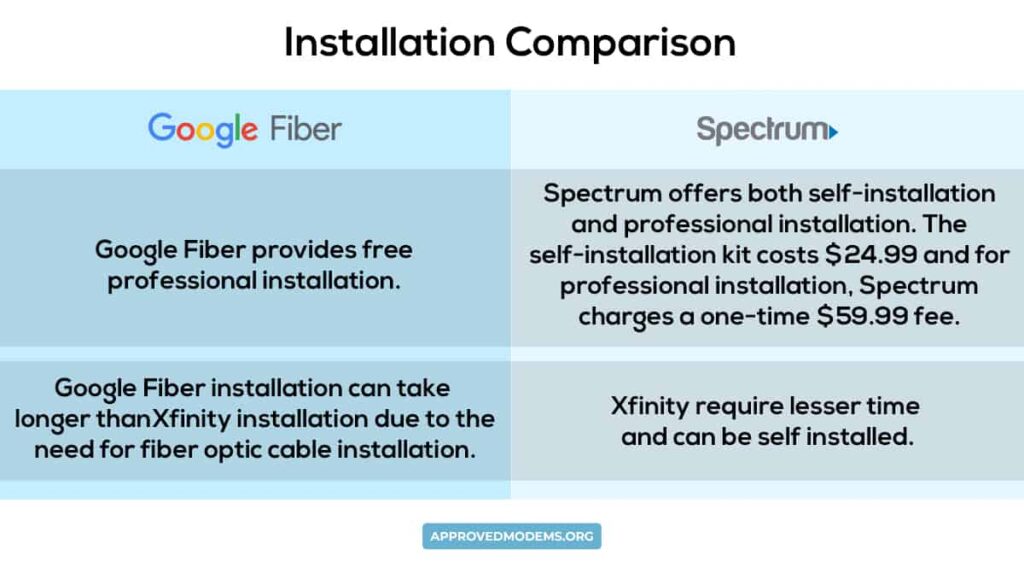
Google Fiber provides free professional installation, which includes setting up the network box and fiber jack and configuring all connected devices. The installation process usually takes a few hours, and a technician will guide you through the process.
In contrast, Spectrum offers both self-installation and professional installation. The self-install kit costs $24.99 (for service activation) and comes with a modem and a router (or gateway), and you can set up the connection yourself.
If you prefer professional installation, Spectrum charges a one-time $59.99 fee.
Winner: If you prefer to have a technician handle the installation process, Google Fiber's free professional installation may be the better option.
Pros and Cons of Google Fiber
Here are the pros and cons relevant to Google Fiber, allowing you to make easy decisions:
Pros
- Fast, reliable speeds
- No hidden cost
- Good customer support
- Free Installation
- No data cap
- No contracts
Cons
- Only two plans
- Limited coverage
- No plan in budget
Pros and Cons of Spectrum
Here are the pros and cons relevant to Spectrum Internet, allowing you to make easy decisions:
Pros
- Competitive pricing
- No data cap
- Wider availability
- No contracts
- Budget plans
Cons
- Extra fees for installation
- Costly gig plan
Customer Service & User Reviews
Both Google Fiber and Spectrum offer several ways to reach their customer support teams. Google customers have the option to reach out to their customer support team by calling (866) 777-7550, initiating a chat online with a representative, or sending an email to the support team.
Spectrum customers can call the customer support number 888-369-2408 to speak with a representative directly. They also have the option to chat with a support representative online through the Spectrum website.
When it comes to customer service, Google Fiber has a reputation for providing excellent customer support. Spectrum's customer service, on the other hand, has received mixed reviews.
While some customers have had positive experiences with their support team, others have reported long wait times on the phone and unhelpful responses.
Here's what Google Fiber users have to say about the service:


Here's what Spectrum internet users have to say about the service:


Frequently Asked Questions
Google Fiber offers faster internet speeds and better customer service, but it is only available in select cities and can be more expensive. Spectrum, on the other hand, is more widely available, has a range of plan options, and can be more affordable.
Google Fiber offers only two plans currently. The price for the 1 Gig plan is $70/month, whereas the top-tier 2 Gig plan costs $100/month. There are no extra or hidden charges.
Spectrum offers a range of internet plans with varying prices depending on the location and plan. The starting price for Spectrum Internet is around $49.99 per month for speeds up to 300 Mbps, and prices can go up to $89.99 per month for the fastest internet speeds available in your area, which is usually up to 1 Gbps.
One potential downside of Spectrum is that some customers may experience slower internet speeds during peak usage hours or in areas with heavy network traffic. Another common complaint is that the promotional prices may increase after the initial period, resulting in higher bills.
Both the ISPs are really good and you can go with any of them. Google Fiber may be a better choice for you if you need very fast and reliable internet service, and if it is available in your area.
Spectrum may be a better choice for you if you need more affordable and widely available internet service, and if you don’t mind paying extra fees or dealing with lower customer satisfaction.



